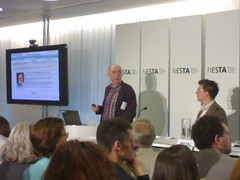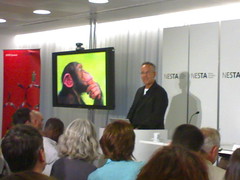I’m at the National Endowment for Science, Technology and the Arts (NESTA) office in London where Howard Rheingold (who I’ve known online for many years and have had the pleasure of meeting, and interviewing, on a number of occasions) has just taken the stage to give a presentation about "mass collaboration".

Howard, who has authored a number of influential books about human uses of technology including Virtual Community and Smart Mobs, is currently a visiting professor at a number of universities (non-residential fellow at
USC’s Annenberg Center for Communication; visiting professor at
DeMontfort University (Leicester, UK) and Lecturer at Stanford
University) sees a new pattern emerging – one where, instead of competition, in many areas of life people and groups are starting to work in collaborative ways.
Howard said this observation came to him as he was writing Smart Mobs and he’s continued thinking about it ever since, collecting instances of it through the Smart Mobs group blog.
"Science, for thousands of years, had dependended on independent geniuses to come along… they can report and publish and others can build on it… I think you can make the case that the first virtual community came from this spread (of Protestant printed works)…"
"Capitalism as we know it came from… the diffusion of inexpensive pamphlets… the idea of limited liability… stock corporations…. these were all ways that people, literate people, could do transactions with each other. They’d not had the instruments to do this before…"
Rheingold then introduces three mythic narratives – the social dilemmas:
- The Prisoner’s Dilemma
- The Tragedy of the Commons
- Public Goods
Tragedy of the commons: every shepherd is going to graze as many sheep as he can and without some strong external authority, humans are doomed to deplete and despoil resources… Ostrom looked at this and found that, although true in many instances, there are incidents of sharing and collectivity. Ostrom identified a number of common aspects to successful arrangments of collectivity including clearly defined boundaries, monitoring, dispute mechanisms, etc.
There are, of course, lots of examples of people doing things collaboratively – Seti@Home, Wikipedia, even Amazon Associates and Google Adsense.
What do technologies that help people work together collaboratively have in common? According to Rheingold, they’re all:
- Easy to use
- Enable connections
- Open
- Group forming
- Self-instructing
- Leverage self-interest
You can see a map of these technologies, the ideas behind them, and how they might be useful for collaboration at cooperationcommons.com as well as on flickr.
Next up is Mark Earls, a former ad man, and author of Herd. He talks about Ubuntu, an African idea about "working together". The fundamental strategy of primates was, according to Earls, being part of the group. Robin Dunbar research, the "Super Social Ape" (see R Dunbar: Grooming, Gossip and the birth of Language), where he found that the size of the neo-cortex of different apes and primates corresponded with the size of group they successfully lived in.

I had a look at Earl’s blog and found this nice quote:
Just a word from someone much wiser than me, Gandhi, the founder of Modern India.
"Interdependence is and ought to be as much the ideal of man as self-sufficiency. Man is a social being."
In his talk, Earls makes a passionate argument as humans as a social creature – the ultimate social creature – and says our success is dependent upon this. What are the cornerstones of our existence as social creatures?
- Copying: We start at birth and keep using copying as a strategy, every day of our lives. Fashion is an example of this. Earls says Amazon has 16 "social features" on every item in their catalogue that help people to copy other’s behaviour and drives sales.
- Belonging: Being with other people (eg. relationships) is what life is all about. People want to be a part of something and Earls says this is what drove the outpouring of shock following the death of Diana; it’s also what makes people join singing in a football stadium.
- We love doing things together: "If you want to get people to do things, you need to facilitate it." Earl’s example is Nike’s Run London.
The really exciting truth about who we are is that we are, according to Earls, social creatures rather than individuals… and embracing this model is a lot more fun.
Nico has been sitting next to me, banging away on his Treo, so I reckon he’ll have more soon…
Audio from the two keynotes and the Q&A session is now available on the NESTA podcast feed. Video of the sessions to follow shortly.
http://feeds.feedburner.com/nestapodcast
Glad you enjoyed the session, it was a real pleasure for me to hear Professor Rheingold speak, I was a little star-struck!
Hi Robin,
Good to meet you last night and thanks for blogging in such detail about Mass Collaboration. I’m glad you enjoyed it and hope to cross paths again soon. I blogged about it here:
http://blogs.nesta.org.uk/connect/2007/09/cooperation-com.html
Webcasts of the whole event will be online imminently I’m assured.
Regards,
Roland
You get the best gigs :-)
Thanks for sharing Robin!
DK